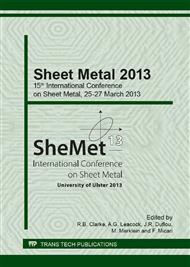p.484
p.492
p.503
p.511
p.521
p.529
p.537
p.547
p.557
Electric Energy Consumption Analysis of SPIF Processes
Abstract:
Manufacturing processes, as used for discrete part manufacturing, are responsible for a substantial part of the environmental impact of products, but are still poorly documented in terms of environmental footprint. A thorough analysis on the causes affecting the environmental impact in metal forming processes, especially the innovative but very energy intensive sheet metal forming technologies required to form light-weight products, is nowadays necessary. Therefore, this paper presents an energy consumption analysis, including a power and time study, of Single Point Incremental Forming (SPIF) processes. First, the influence of the most relevant process parameters (e.g. feed rate, step down) as well as the material forming itself are analysed regarding the power demand. Moreover, a comparative study and related energy efficiency assay are carried out on two different machine tools. As the forming time proves to be the dominant factor for the total energy consumption, from environmental point of view, the overall results show many similarities with conventional machining processes. Finally, this paper reports on some potential improvement measures to reduce the SPIF energy consumption.
Info:
Periodical:
Pages:
547-554
DOI:
Citation:
Online since:
April 2013
Price:
Сopyright:
© 2013 Trans Tech Publications Ltd. All Rights Reserved
Share:
Citation:


